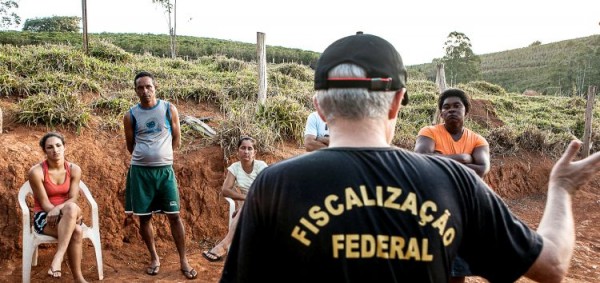
Machado, MG, 14/07/15 – DanWatch – Ministry of Labour team makes assessment on farm that kept workers in inhumane conditions.
Photo: Lilo Clareto/DanWatch
The Brazilian Coffee Exporters Council (CECAFÉ) has issued a response to allegations of slavery-like conditions in the coffee supply chain in Brazil (see Report describes ‘Slavery-like’ conditions in Brazilian supply chain)
In a statement, Luciana Florêncio, CECAFÉ’s Executive Director, said CECAFÉ and other entities in the Brazilian coffee sector – and Brazilian society as a whole – are committed to fighting slave labour and to the enforcement of legislation preventing slave labour. She said CECAFÉ was committed to the enforcement of labour and environmental laws and to the prevention of any new cases of breaches of those laws.
“Many actions are being taken in several areas, at public and private levels. We understand that recent reports about bad practices have turned a crisis into an opportunity for the joint action by all of those involved in the Brazilian coffee sector,” said Mrs Florêncio. “We have also realized our flaws in not communicating what has already been done by over 300,000 producers, exporters, retail and the Brazilian government to support a sustainable supply chain.
“We lack sustainability indicators and are working on them in a group involving several private and public organizations,” she said. “We invite experts – as well as the media and anyone interested in Brazilian coffee – to see what has been done for decades to guarantee efficiency inside and outside the farm, from the field to cup. Brazilian coffee farmers are doing whatever is needed in order to keep respect the law and preserve nature. We can assure consumers that Brazilian Coffee is sustainable and respects farmers, coffee workers and nature (see more about the Brazil’s position at the Global Slavery Index).”
Mrs Florêncio said CECAFÉ is now a member of Inpacto (the National Pact for the Eradication of Slave Labour), a NGO that has been fighting against slave work for many years, along with other private entities, companies and multinationals. “Through our Digital Coffee Farmers Programme, in which we teach farmers how to use a computer, we are also investing in knowledge transfer for small coffee farmers, teaching them how to comply with the Sustainable Coffee Programme (SCP) and all Brazilian legislation. We reached 2,000 farmers in the last years and we have done more to improve this number along with important partnerships such as the Global Coffee Platform. Although the number is not high, they are generating solid results and guaranteeing that sustainability is being put into practice by farmers who have been trained, who help to spreading what they have learned in their local communities.”
“CECAFÉ has plenty of other initiatives to enhance sustainability of the Brazilian coffee,” Mrs Florêncio concluded. “We sincerely hope the real Brazilian coffee chain will come to light and serve as benchmark in future. Other challenges will come but we are aware of Brazil’s leadership role in these matters.”


Deixar um comentário